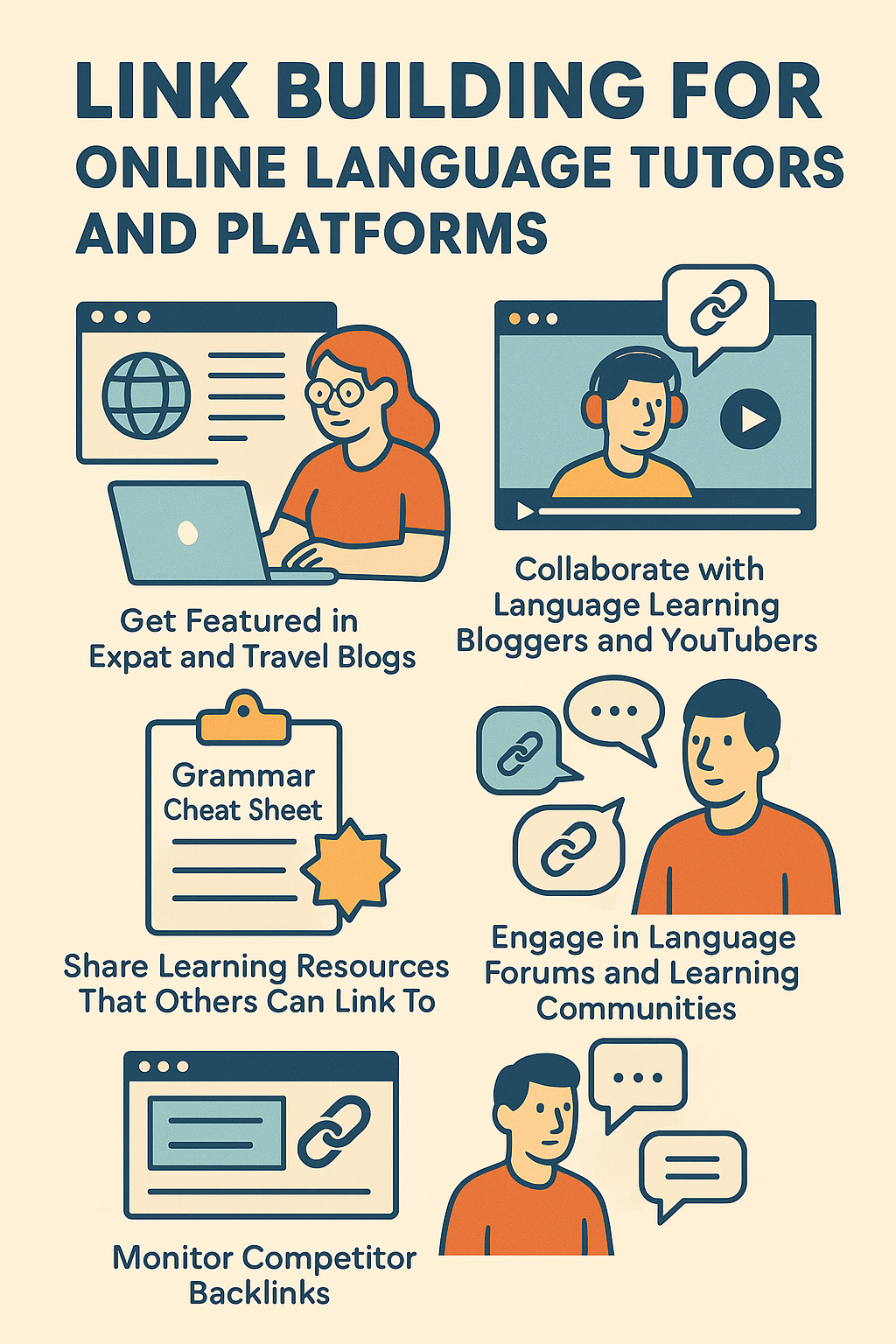The demand for online language learning is skyrocketing. Whether someone is preparing to move abroad, advancing their career, or simply fueling a passion for culture, there’s no shortage of people seeking high-quality language tutors online. But with growing competition, how can independent tutors and language learning platforms stand out?
One answer lies in link building.
Backlinks—links from other websites to yours—are one of the most powerful tools in search engine optimization (SEO). They not only help improve your rankings in Google but also build trust and visibility among potential students. For online language tutors, the right backlinks can mean the difference between being discovered—or being overlooked.
The good news? There are countless backlink opportunities in the language learning space. From travel and expat blogs to education directories and learner communities, there are many places where your expertise can shine—and earn you lasting visibility.
In this article, we’ll explore smart, ethical link-building strategies specifically for online language tutors and platforms. You’ll learn how to grow your authority, attract more students, and turn your teaching business into a recognizable and respected brand.

1. Why Link Building Is Crucial for Language Tutors
In a competitive online education market, simply offering excellent lessons isn’t enough—you need to be discoverable. That’s where link building comes in. A backlink—a link from another website to yours—serves as a digital vote of confidence. When trustworthy sites link to your platform, search engines interpret that as a signal of relevance and credibility.
For language tutors, this has a direct impact on your visibility for high-intent search terms like:
- “online Spanish tutor for beginners”
- “best way to learn German online”
- “IELTS speaking practice with native teacher”
The more high-quality backlinks you earn, the better your chances of ranking on page one—where potential students are most likely to click.
But beyond search rankings, backlinks also generate referral traffic. For example, if an expat blog links to your English tutoring page in an article about adapting to life in Berlin, their readers—who are actively looking for help—are more likely to click, explore, and book a session.
Backlinks also build trust. Being mentioned on a respected education site or language blog makes you look more credible in the eyes of cautious learners, especially those making their first investment in a tutor.
In short, smart link building helps your teaching business grow in both authority and reach—connecting you with learners around the world in a scalable, sustainable way.
2. Get Featured in Expat and Travel Blogs
Expatriates and long-term travelers often seek language tutoring to adapt to their new environments, making expat and travel blogs a valuable source of both traffic and backlinks for online language tutors. These blogs frequently publish content about adjusting to life abroad, and learning the local language is always a major topic.
How to leverage this opportunity:
- Find relevant blogs: Look for websites that focus on relocating, digital nomad life, working abroad, or retiring in another country.
- Offer value: Reach out to the blog owners with tips or insights on learning the local language, like “5 Phrases Every Foreigner Should Know in Thailand” or “How Learning Spanish Helped Me Integrate in Madrid.”
- Pitch your services: Suggest being featured as a recommended resource, or offer a guest post or interview on language acquisition.
- Provide shareable content: Language cheat sheets, cultural faux pas to avoid, or beginner learning roadmaps can be perfect linkable assets.
Pro tip: If the blog accepts guest submissions, write an article that includes a contextual backlink to your homepage, lesson booking page, or a helpful resource you offer.
Not only do these blogs often have high domain authority, but their readers are actively searching for help with integration — which means they’re more likely to appreciate and engage with your language services.
3. Collaborate with Language Learning Bloggers and YouTubers
The online language learning community is vibrant and content-rich, with countless bloggers, YouTubers, and podcasters sharing their language journey, reviewing tools, and recommending tutors. Partnering with these creators is an excellent way to gain targeted exposure and earn high-quality backlinks.
Steps to collaborate effectively:
Identify creators who focus on your teaching language or target audience (e.g., Spanish learners, business English, JLPT prep).
Offer something of value: a free trial lesson, access to your course, or an interview about language teaching techniques.
Suggest a content angle: for example, “Top Online Tutors for Intermediate French Learners” or “Best Ways to Practice Speaking with a Native Teacher.”
Request a backlink in the blog article, YouTube video description, or accompanying podcast notes.
Many of these content creators have active websites where they publish blog posts, lesson plans, and reviews—perfect locations for a backlink to your teaching site.
Bonus idea: Contribute a guest post to their blog with useful content like “5 Mistakes English Learners Make in Job Interviews” or “How to Sound More Natural in Conversational Japanese.” Include a short author bio with a link back to your website or lesson page.
Collaborations like these build visibility, credibility, and trust—especially when the content lives on well-trafficked platforms frequented by motivated language learners.
4. Submit to Educational Directories and Marketplaces
Getting listed in reputable educational directories and tutoring marketplaces is one of the most straightforward ways to earn authoritative backlinks and reach students actively searching for language instruction.
Top platforms to consider:
- Tutoring marketplaces: Preply, italki, Superprof, Cambly, Verbling
- Education-focused directories: Classgap, LearnPick, Wyzant, Apprentus
- Local directories: Regional or city-based tutor lists, community learning hubs, or ESL organization websites
Tips for optimizing your listings:
- Write a compelling, keyword-optimized bio that includes your teaching experience, specialties (e.g., business English, DELE exam prep), and the languages you teach.
- Include your website link in your tutor profile where possible—this often results in a dofollow backlink.
- Add testimonials or student success stories if allowed.
- Update your availability and services regularly to stay visible in search results within the platform.
Why it works:
These platforms often have high domain authority and excellent SEO, meaning your tutor profile could rank on page one for relevant search terms—even before your own site does. And for independent tutors with their own websites, these listings provide both credibility and direct traffic from learners who are ready to book.
5. Share Learning Resources That Others Can Link To
Creating and publishing high-quality language learning resources on your website is one of the most effective ways to attract natural backlinks. These resources serve as helpful tools for students, teachers, bloggers, and even journalists looking to support their own content.
Types of link-worthy resources you can create:
- Grammar cheat sheets for common issues in your target language
- Vocabulary lists for specific situations (e.g., travel phrases, business meetings, medical terminology)
- Downloadable PDFs: verb conjugation tables, pronunciation guides, or language learning schedules
- Mini quizzes or challenges to test vocabulary or listening comprehension
- Beginner guides: “How to Start Learning Italian” or “Top 10 Free Tools for English Learners”
How to increase backlinks:
- Share your resources with other language bloggers, online educators, and communities—they often link to useful material in their posts.
- Submit your tools or downloads to curated resource pages for teachers or learners.
- Promote the content on Reddit (e.g., r/languagelearning), Discord servers, and Facebook study groups.
- Offer embed codes or attribution links for educators who want to include your material in their own lessons or blog posts.
The key is to focus on quality and usability—resources that genuinely help people learn faster or more effectively tend to earn links naturally, making your website a go-to hub for both learners and fellow educators.
You can submit articles to get quality backlinks using:
PRnewsIO https://prnews.io/sites?i=18039
Collaborator.pro https://collaborator.pro/?ref=bVEnob
PRposting https://prposting.com/ref/YG5EO7N6
Note: There are affiliate links in the link given above and if you buy something, I’ll get a commission at no extra cost to you.
You can alsouse another tool to buy quality backlinks: https://app.brandcitations.com/?refer_id=17217
6. Engage in Language Forums and Learning Communities
Forums and online communities are where language learners go to ask questions, share experiences, and find recommendations. By participating in these spaces as a helpful, knowledgeable contributor, you can build your reputation and earn backlinks organically—without coming across as spammy or self-promotional.
Top communities to engage in:
- Reddit: Subreddits like r/languagelearning, r/Spanish, r/French, etc.
- Duolingo forums: Active community for language learners discussing everything from grammar to pronunciation.
- Discord servers: Many servers are built around language exchange, exam prep (IELTS, DELE), or specific language pairs.
- Facebook groups: Communities like “Language Learning Tips & Tricks” or “English Learners and Tutors”
Best practices:
- Add value first: Answer questions thoughtfully and provide helpful resources—whether it’s advice, study tips, or tool suggestions.
- Link sparingly and contextually: Only share your site or blog posts when they directly solve someone’s problem (e.g., a guide on past tense in French).
- Build relationships: Over time, your name and brand will be associated with expertise, leading others to reference or link to your content even without prompting.
These communities not only help with backlinks, but also provide insight into what language learners are struggling with—giving you endless ideas for new content and resources worth linking to.
7. Monitor Competitor Backlinks and Replicate What Works
One of the most efficient ways to find quality backlink opportunities is by analyzing what’s already working for other online language tutors or platforms. If your competitors are ranking well in search results, there’s a good chance they’ve earned strong backlinks—and you can often approach the same sources.
How to do it:
- Use tools like Ahrefs, SEMrush, Moz, or Ubersuggest to view your competitors’ backlink profiles.
- Identify the domains linking to them—look for:
- Blog features
- Guest posts
- Directory listings
- Roundup articles (e.g., “Top Tutors for Learning Japanese Online”)
- EDU or NGO partnerships
Replicate and improve:
- Reach out to the same websites with a personalized pitch that showcases what makes your services different—such as a unique teaching method, language specialization, or downloadable resource.
- If you find broken links pointing to outdated or removed content, offer your own updated guide or page as a replacement. This is known as the broken link building strategy.
- Suggest improvements: if their existing post is outdated or missing useful tips, offer to contribute updated content with a link back to your site.
By using competitor insights as a roadmap, you can skip the guesswork and focus on link building efforts that have already proven successful in your niche. Over time, this method can help you build a backlink profile that rivals or even surpasses theirs.
Conclusion
In the world of online language tutoring, visibility and trust are essential—and link building is one of the most powerful ways to achieve both. By earning high-quality backlinks, you not only improve your search engine rankings but also reach motivated learners through the blogs, directories, and communities they already trust.
From collaborating with travel bloggers and language influencers to sharing valuable learning resources and engaging in active forums, the strategies outlined in this article are practical, scalable, and tailored specifically to your niche.
Remember: link building isn’t about chasing quantity—it’s about building meaningful connections with relevant sites that reflect the value you bring as an educator.
Start with one or two strategies—maybe pitch a guest article to an expat blog or share a grammar cheat sheet on Reddit. Then keep growing from there. As your backlink profile strengthens, so will your ability to reach students, earn their trust, and grow your tutoring business into a recognized name in the language learning world.
Ready to grow your online visibility? Begin building those links today, and let your expertise speak fluently to the world.
Запитати в ChatGPT





